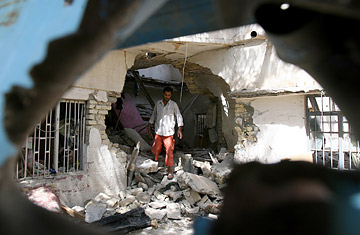
An Iraqi man walks through a house that was destroyed in an attack in the Washash area, western Baghdad, Iraq.
At the edge of a dirt crater 40 feet wide and 20 feet deep, Lieutenant Shawn Spainhour and Sheikh Dawood Rashid al-Shuhaib stare down in silence at the wreckage. In August 2007, the U.S. military bombed the sheikh's house, obliterating it with a 500-lb. JDAM "bunker buster." The rest of the village was flattened by artillery. Spainhour, in full battle gear — flak jacket, helmet, knife, guns, boots, camouflage and radio — turns to the grief-stricken, 60-year-old sheikh, who is wearing resplendent traditional Arab dress, and asks his translator to tell him that "I sincerely apologize for everything that has happened here." Spainhour pauses as they survey the damage. "It's the cost of war." Literally. Coming along with the apology will be U.S. dollars.
That's why the sheikh and Spainhour stroll through this former war zone together: to survey the extent of the damage. Spainhour and his commanding officer are trying to help the sheikh rebuild his village as part of the larger strategy to bring peace and reconciliation to their corner of Baghdad. It illustrates the paradigm shift that has been taking place for the U.S. military across Iraq — trying to win over both former enemies and stave off potential new ones with the use of large sums of cash.
The trouble is that there is only so much cash available. The sheikh says his house will cost about 200 million Iraqi dinars, or about $150,000, to rebuild. Lt. Spainhour explains that big money is very hard to get, but that supplies and humanitarian assistance might be available. Spainhour's superior, Captain Douglas Willig, says the U.S. military can offer about $1,000 per family for claims money; he can offer them micro-grants to start small businesses; and he has two construction packs for a school and a marketplace each worth about $20,000. "I want to help you help your village for the future," Willig tells the sheikh. "The most important thing is you coming to talk to us about your problems." The sheikh and the 34 families of his village are likely to get a total of $100,000 in cash, grants, jobs and material.
According to Lt. Col. James Hutton, a U.S. Army public affairs officer, in the fiscal year 2006 9,257 claims were filed in Iraq, of which 3,658 were paid, totaling $8,397,726. Fewer were filed in and paid out in 2007 — 7,103 and 2,896 respectively — but the total dollar amount was larger: $13,074,660. U.S. officers praise the program, though it is impossible to say how many Iraqi hearts and minds have been appeased. It can take months for a claim to be paid and if a claim is filed after the U.S. military unit involved is rotated out of Iraq, the odds are that the claim will never be awarded. In Iraq today, it is not uncommon for Iraqi civilians to beseech mid-ranking U.S. officers for claims for damages done in 2003 or 2004.
In the case of Sheikh al-Shuhaib, he and the village's other families — all Shi'ite Muslims — had been kicked out in November 2006 by al-Qaeda fighters, who commandeered the sheikh's house, using it as their headquarters until they were routed by American firepower this past August. Now, after filing a claim with the U.S., he has come back to retake his property and to rebuild. The sheikh is confident that he will get the help he needs from the U.S.: "I do trust [the Americans] helping me rebuilding my house and my village again, and they will do it."
A comprehensive database of Iraqi claims for war damage compensation is not available. Critics of the program, especially of the money paid out to the families of innocent Iraqi families killed in conflict, complain that the military does not proactively release these documents. Last year the ACLU filed a request under the Freedom of Information Act and received about 2,000 pages of information, a snapshot of part of 2005 and 2006, but it is by no means comprehensive or complete. The U.S. has been known to pay up to $2,500 for an "accidental" killing.
Sarah Holewinski, executive director for the Washington-based Campaign for Innocent Victims of Conflict (CIVIC), a group lobbying for fair and equal treatment for families of bystanders killed in conflict by the U.S. military says: "The military has a big interest in getting it right. Right now, we see a good effort but not good implementation. Make sure payments are fair, make sure they're uniform from one family to another, make sure they're immediate following the bombs and bullets and make sure this is true whenever U.S. troops head into combat — that's how you properly dignify deaths and injuries. Anything less diminishes the impact and cheapens the good intentions." Senator Patrick Leahy, chairman of the Judiciary Committee, has drafted legislation with the input of CIVIC that would ensure a fair compensation program for civilians accidentally harmed by U.S. forces in conflict. It is expected to be introduced later this year.
